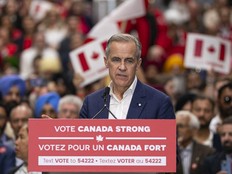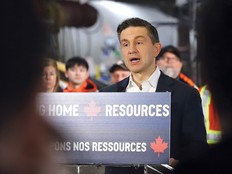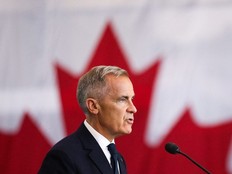Franco Terrazzano
LATEST STORIES BY FRANCO TERRAZZANO
TERRAZZANO: Carney’s budget worse than Trudeau’s
Liberal Party Leader Mark Carney’s strategy depends on being different from former prime minister Justin Trudeau. Trudeau’s former finance minister, Chrystia Freeland, resigned just hours before the Trudeau government tabled its last budget update. Freeland cited the “costly political gimmicks, which we can ill afford and which make Canadians doubt that we recognize the gravity of the moment” for her resignation.

OPINION: Canadians win when politicians compete on tax cuts
The best way the government can make life more affordable is to let people keep more of their own money and tax cuts will do just that. After years of higher taxes, this election is turning into a tax-cutting campaign. Liberal Leader Mark Carney announced he would cut the lowest income tax bracket by one percentage point. Carney estimates that would save a two-income family up to $825 a year. Conservative Leader Pierre Poilievre announced he would more than double Carney’s promised income tax cut. Poilievre would cut the lowest income tax bracket from 15% to 12.75%. That would save a two-income family up to $1,800. Both major parties are duelling over who can cut taxes the most. So far, Poilievre is offering twice as much income tax relief as Carney. Poilievre’s tax cut would cover the cost of groceries for a family of four for more than a month. Those savings could buy new bicycles for a dozen kids or cover six months of swimming lessons for five children. Tax cuts matter because the amount of money governments take from Canadians is obscene. The average Canadian family pays about 43% of their income in taxes. Canadians are forced to pay more in taxes than they spend on food, housing and clothing combined. The government taxes Canadians way too much and it needs to stop because half the population is broke. About 50% of Canadians report they are within $200 of not being able to make the minimum payments on their bills each month. Politicians are also promising to cut carbon taxes. Carney is cutting the consumer carbon tax to zero on April 1. That carbon tax suspension will save people about $13 when they fill up a minivan and about $20 when they fill up a pickup truck. Big-rig truckers will save about $200 when they fill their tanks with diesel, and the average household will save about $400 on a year’s worth of home heating. But the devil is always in the details. Carney isn’t scrapping the carbon tax. He plans to “change” it. Carney plans to hit businesses with hidden carbon taxes and hopes Canadians won’t notice when businesses have to pass on those costs through higher prices and fewer jobs. What Carney won’t admit is that a fuel refinery can’t just eat the cost of his hidden industrial carbon tax. It has to add it to the price of the gasoline and diesel it’s producing for gas stations to sell. The same goes for a fertilizer plant that has to pass on carbon tax costs to farmers, which will make food cost more at the grocery store. Steel and aluminum companies will have a crucial choice to make: Will these businesses stick around in Canada, getting hammered by hidden industrial carbon taxes, or will they shift production to the United States, where they won’t be punished with carbon taxes? This is why Poilievre’s promise on carbon taxes is a game-changer. Poilievre is the first major political leader in Canada to promise to scrap all carbon taxes. By getting rid of the consumer carbon tax and hidden carbon taxes on business, Poilievre would save Canadians serious money. Obliterating the hidden industrial carbon tax also reduces the risk of industries fleeing to the U.S. and taking jobs with them. After years of higher taxes, this election is off to a good start for taxpayers. Now, all party leaders should commit to big tax cuts for Canadian businesses to make them more competitive in the wake of American tariffs Franco Terrazzano is the federal director and Kris Sims the Alberta director of the Canadian Taxpayers Federation

OPINION: Poilievre vows to scrap the carbon tax – for real
This is a game-changer. Conservative Party Leader Pierre Poilievre vows to scrap all carbon taxes. Poilievre said his government would scrap the hidden industrial carbon tax on Canadian businesses and manufacturers. This makes Poilievre the first federal political leader to commit to ending all carbon taxes. This is great news for hard-working Canadians. The hidden industrial carbon tax is bad news for two big reasons: First, industrial carbon tax costs are passed on to consumers. When governments nail fuel refineries, utility companies and fertilizer plants with carbon taxes, it makes gas, diesel, home heating and food more expensive. Second, U.S. President Donald Trump wants to steal Canadian businesses and manufacturers. The Canadian industrial carbon tax punishes those businesses. A hidden carbon tax on Canadian businesses is a cruel way of pushing them across the border. Meanwhile, Prime Minister Mark Carney announced his Liberal government would remove the consumer carbon tax “immediately.” But the devil is always in the details. And Carney’s carbon tax plan has split hooves and horns. Carney said he was “immediately” lowering the consumer carbon tax to zero, but the paper he signed says the relief won’t happen until April 1. That move, if it happens, would save Canadians about 17¢ litre of gasoline and about 21¢per litre of diesel. Fuelling up a pickup truck would be about $20 less and gassing up a minivan would be about $13 cheaper. Canadian households would save about $400 on their home heating bills every year. Canadians struggling to fill up their gas tanks and pay their heating bills need that carbon tax cut now. So, it’s baffling and callous for Carney to needlessly make people wait a few more weeks for help. He should be doing what he promised and scrapping the carbon tax immediately. He knows it’s the right thing to do. Canadians fought back against the carbon tax so hard that even Carney, the Godfather of the Carbon tax, had to admit it was radioactive. That is a huge victory for Canadians. Carney wrote a 507-page book praising carbon taxes and he was the United Nations Special Envoy on this topic, so it’s a big deal to make him admit the carbon tax is a big problem. Here’s the catch: Carney says he’ll move the cost of the carbon tax onto Canadian businesses and factories by cranking up the industrial carbon tax. This is bad for Canadians because they will still be paying the cost of the carbon tax, but it will just be tougher to know where the pain is coming from. For example, a fuel refinery supplying gasoline and diesel can’t just eat the cost of the industrial carbon tax. Those businesses must pass the increased cost on to the gas station. It’s the same for a fertilizer plant. The carbon tax will drive up costs for farmers and that will make food cost more. Carney wants to hammer businesses with carbon taxes and hopes Canadians won’t notice when businesses pass those costs on to consumers through higher prices. “So in changing the carbon tax … we are making the large companies pay,” Carney said. Carney’s problem is that Canadians don’t believe him. Just 12% of Canadians believe businesses pay most of the cost of the industrial carbon tax, according to a recent Leger poll commissioned by the CTF. Meanwhile, 70% said businesses would pass most or some carbon tax costs on to consumers. Carney’s other problem is Trump isn’t imposing carbon taxes on American businesses. Neither have recent Democratic administrations. Trump wants to bully Canadian businesses and Carney’s industrial carbon tax will help Trump make that a reality. Canadians’ problem is that Carney’s carbon tax is a recipe for disaster — higher prices, fewer jobs and less production in Canada. Fortunately, Poilievre’s commitment to scrap the industrial carbon tax is a game-changer. Carney must explain why one carbon tax makes life more expensive, but the other is just fine. Franco Terrazzano is the federal director and Kris Sims the Alberta director of the Canadian Taxpayers Federation

OPINION: Canada can’t afford any carbon taxes
All carbon taxes must be scrapped in Canada for three key reasons. First, a carbon tax on businesses is a carbon tax on Canadians that we can’t afford. Second, the United States is ready to steal our businesses and Canada’s carbon taxes are giving our businesses a push out the door for them to leave. Third, the hidden, industrial carbon tax is a permanent way for the government to keep draining money from Canadian job creators and workers. No matter the label, all carbon taxes are ultimately paid by normal working people. Liberal leadership candidate Mark Carney plans to hide the consumer-facing carbon tax while continuing to hammer businesses with ever-increasing carbon taxes. Carney is playing a dangerous game of hide-and-seek with his carbon tax plans. Carney doesn’t want to scrap the carbon tax. To use his words, he just wants to “change” it. “So, in changing the carbon tax … We are making the large companies pay for everybody,” Carney said. Here’s Carney’s problem: Canadians aren’t stupid. Just 12% of people believe Carney when he claims that businesses will pay most of the cost of an industrial carbon tax, according to a Leger poll. Meanwhile, 70% said businesses would pass most or some of those costs to consumers. The poll gets worse for Carney. Among those decided on the issue, 85% of Canadians – including the majority of voters in every party – believe businesses will pass most or some of the cost on to consumers. Canadians understand these clear facts: Carbon taxes on fuel refineries make gasoline and diesel more expensive. Carbon taxes on utilities make home heating and power bills more expensive. Carbon taxes on fertilizer plants increase costs for farmers and that makes groceries more expensive Here’s the second reason why Canada needs to scrap all carbon taxes now: U.S. President Donald Trump. Trump is trying to lure away our businesses and Carney’s hidden carbon tax would help him do it. The U.S., like most countries, doesn’t impose a national carbon tax. Right now, Trump and his administration are on a stampede, trying to make deals for their own country. They don’t bat an eyelash at inflicting financial and trade damage on other countries. Picture Trump on the phone in the Oval Office, and he’s talking to the heads of car manufacturers, steel plants, fuel refineries, fertilizer plants and energy producers. He is trying to convince them all to set up shop in states like Michigan, Ohio and Pennsylvania. Invest! Make money! Employ people! Make the rust belt chrome again! As good as a salesman as Trump may be, it’s Carney’s carbon tax on businesses that will truly make the case for cutting production in Canada and increasing production south of the border. With Trump’s tariffs dangling over our economy like the sword of Damocles, politicians must be doing everything in their power to make Canada more competitive. The easiest way to do that is to stop hammering businesses with carbon taxes. The carbon tax blew a $12-billion hole in our Canadian economy last year. Third, a hidden industrial carbon tax makes it easier for governments to drain wealth from Canadians. Whenever a tax is less transparent, it is easier for governments to jack it up. The Trudeau government’s carbon tax inflicted pain on Canadians. But at least Canadians can see most of the pain showing up on their heating bills, or they can do the carbon tax math at the gas pump and protest in anger every time the government increases it. Carney’s business carbon tax would inflict real pain, but it would be harder to detect. Carney has refused to provide Canadians with a clear answer to this simple question: How much will your carbon tax cost? Canadians need our government to scrap all carbon taxes. Franco Terrazzano is federal director and Kris Sims is the Alberta director of the Canadian Taxpayers Federation






